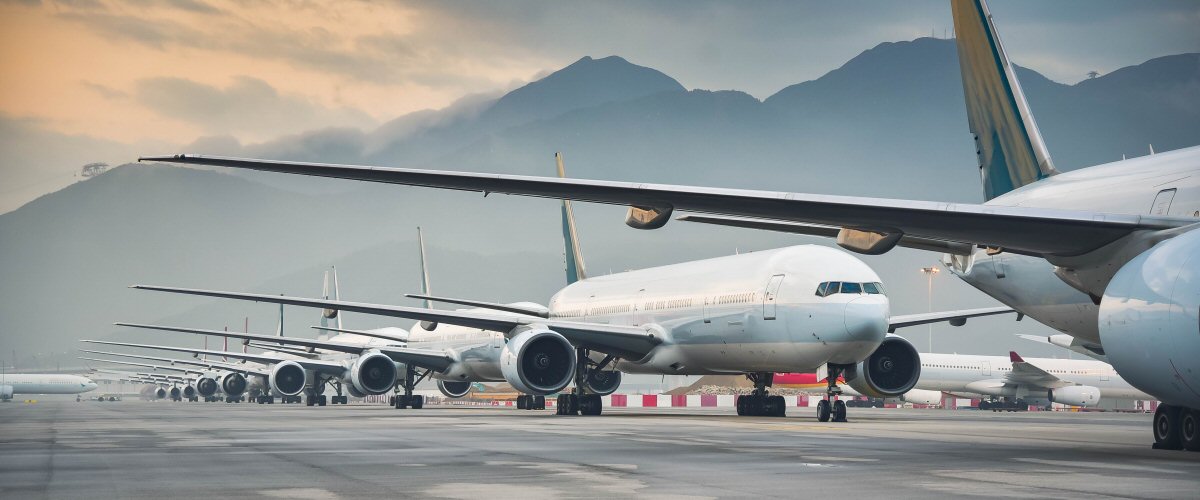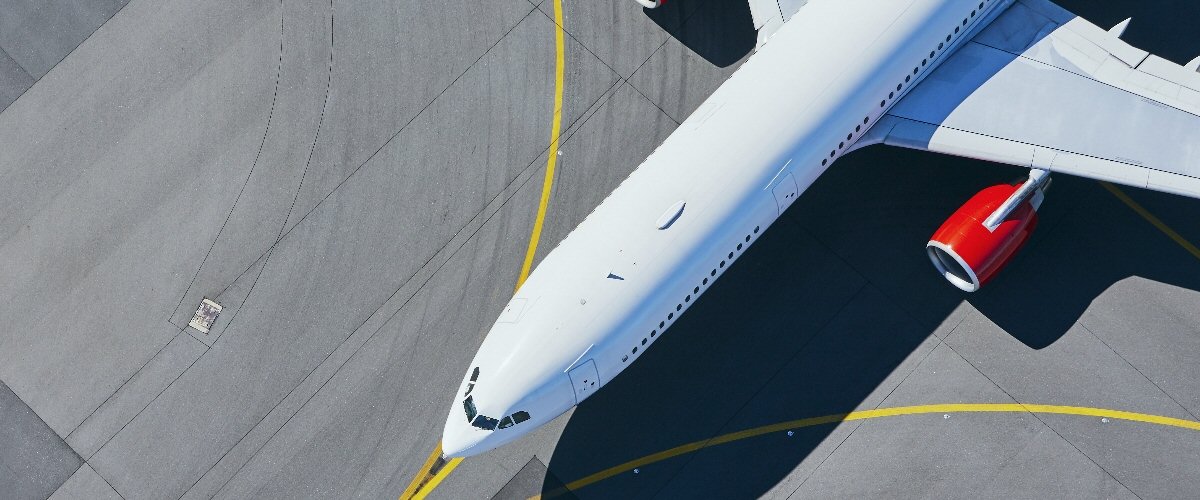Date: 03/05/2024 (Edition 8) Download PDF version
.png)
Last year many of us were intrigued to see the lease of two B777s from Turkish Airlines to IndiGo, an airline of exclusively A320 family narrowbodies (323) and ATRs (50). This did not fit their business model as we knew it. Over 90% of the airline’s flights are domestic, with the international flights principally short-distance migrant worker traffic to the Middle East. With the landmark 500 A320 order at the Paris Airshow in 2023 (their backlog is currently still up at 950), it seemed normal service resumed. However, with last week’s 30 A350 order, with an additional 70 on option, the Indian carrier appears to be leaning into the idea.
Firstly, it is no surprise the airline went for Airbus, with their current order backlog no doubt giving them favour when negotiating the deal. Another interesting detail is that with Airbus’ cockpit commonality, it is said to only take 5 days to train to fly an A350 from being an A320 pilot. This will aid the transition of pilots and help prevent shortages in what is often a tight market. Indian pilot salaries can be as low as US$30,000 a year, a tenth of some of their Middle Eastern counterparts, at the top of the spectrum.
As recently as January 2024 Airbus invested in an Indian flight school for A320 and A350 pilots. However, this was a joint venture with Air India, likely with some clause to prevent pilots from going to their competitor for some time. Moreover, this may discourage Airbus from investing further in the country to not double down on one market. Air India are of course the ones who will look at this order with greatest interest. They currently operate 62 widebodies and their 470 aircraft Paris order was arguably equally as impressive as IndiGo’s since it consisted of 70 widebodies (40 of which were A350s). Six of the A350s have already been delivered in 2023.
Recently, Tata Group announced they hope to complete the Air India Vistara merger by the end of 2024, faster than initially planned. Part of this has included the collation of the low-cost entities in the group, so they are ready to fight for IndiGo’s market share. It appears IndiGo are looking to fight back on the long-haul front!
A question still exists about whether there is a second battleground to fight on though. India is always hailed as one of the fastest growing markets so the immense narrowbody orders do somehow seem feasible, if still extreme. New short-haul markets can always be made if the pricing is right. Long-haul is a different beast, however. Markets must be more established to fill the planes and the fares are often significantly higher. Wealth disparity in the country will mean their consumer base isn’t anywhere near the scale of their current one. Further, the likes of Norwegian teach us that low-cost long-haul can be difficult, as the cabin product often becomes a higher priority to the consumer.
A brief nod goes to whether they consider making themselves a new transit hub, but the competition from the Middle East is fierce, who also have a better geographical location. As if consolidating their lead, Emirates also announced their new $35bn AL-Maktoum airport plans this week, which will consist of 5 runways. The question will therefore be if tourism and the Indian middle-class growth can match the ambition of the two Indian titans.
Two of Europe’s top three airline groups, Lufthansa Group and Air France-KLM have published their Q1 figures this week with higher net income losses than the initial forecasts and Q1 2023. Despite a 5.3% increase in revenue and a 12.1% increase in passenger numbers compared to Q1 2023, Lufthansa Group has suffered a loss of €734m, a 57% increase. AFKLM saw its revenue and passenger numbers increase by 1.5% and 5.6% respectively but noted a €480m net loss compared to the €143m loss in the previous year.
Typically, airlines experience financial losses in the first quarter due to reduced bookings during the low season. However, falling cargo rates, costly strikes, and disruptions arising from capacity constraints and flight cancellations have caused the losses to surpass any initial expectations. This was particularly visible during the initial three months of this year, with Lufthansa spending approximately €350m, primarily on increased staff wages and the financial fallout from flight cancellations. Meanwhile, Air France-KLM faced a compensation payout of €50m, predominantly to customers of its Dutch carrier, further contributing to its financial woes.
With the EBIT margins of LHG and AFKLM dropping by 2.5% and 4.3% year-on-year respectively, it now seems that the rising operating costs have caught up with the dynamic post-pandemic recovery. In response to that, the operators were quick to announce significant cost-cutting measures. Air France-KLM revealed plans to tighten spending for the remainder of the year, including a freeze on hiring support staff, to mitigate financial strains while still warning about a 2% cost increase in the second quarter. Similarly, Lufthansa is set to implement operational cost reductions by hiring staff on new contracts, pausing new projects, and intensifying scrutiny over administrative staffing to curb heavy losses incurred due to strikes. Fortunately, both carriers have confirmed the completion of their collective bargaining agreements and anticipated no further disruptions from strikes or labour negotiations for the remainder of the fiscal year.
As airlines gear up for what they say would be a busy summer season, questions linger about the sustainability of this recovery trajectory. Rising repair and maintenance costs, coupled with ongoing capacity constraints, will likely force airlines to keep fares elevated. The question is whether demand will still support them.
European Union regulators have opened an investigation into 20 airlines for potentially “misleading greenwashing practices”. The claims are largely based on the benefits of offsetting emissions from flying; including creating incorrect impressions that paying an additional fee to finance climate projects can reduce CO2, and supporting the use of alternative aviation fuels can fully counterbalance the CO₂ emissions.
Furthermore, regulators noted that the airlines had made claims about plans to reach net zero emissions “without clear and verifiable commitments, targets, and an independent monitoring system.” The national regulators involved are Belgian, Dutch, Norwegian and Spanish.
As we reported last month on KLM's misleading advertisements and the airline credibility report here, IBA is beginning to see a trend in greenwashing crackdowns. It signifies a rising tide of credibility issues within the industry, and we expect more airlines to be called out soon. However, this does not take away the fact that there are airlines sincere about their sustainability efforts and therefore should be given credit when they do.
Want more aviation ESG news?
Our regular update looks at the key trends and market indicators using data and analytics provided by IBA Insight.





凭借由获奖 ISTAT 认证评估师组成的庞大团队以及 30 多年累积的专有数据,IBA 在全球估值市场上处于领先地位。我们为全球范围内的一系列资产类型提供独立、公正的价值意见和建议,包括飞机、发动机、直升机、货机/航空货运、降落机位和预备件等。IBA 始终致力于超越客户的期望,我们的客观意见为贷款、资产收回、商业开发和再营销提供了必要的安全保障。

IBA 与全球领先的飞机和发动机租赁公司精诚合作。我们的专业建议植根于深厚的行业知识,因此 IBA 可以在投资周期的各个阶段提供支持,让客户放心无忧。从估值、机队选择、投资组合开发,到租赁结束时的退租和再营销,我们将全程协助客户完成整个租赁期的所有风险评估和资产管理活动。

航空投资往往错综复杂,会涉及大量财务风险,因此,放任资产不去管理绝对是下下策。无论是首次投资的新手,还是市场上驾轻就熟的资深投资者,IBA 都能帮助您克服各种资产类型的复杂性,让您更好地了解各种投资机会。我们可以与您携手合作,支持您的投资组合开发、多元化发展并满足您的战略需求。

30 多年来,IBA 与全球和地区航空公司紧密合作,提供估值和咨询服务、航空数据情报以及飞机和发动机的退租支持。我们在遍布世界各地的各种航空项目上与客户展开协作,满足他们的额外资源需求,随时随地提供所需的项目管理支持。

我们掌握着丰富资源并善于出谋划策,可为客户提供诉讼支持和纠纷调解办法,并根据客户的法律策略量身定制周密的解决方案。正是由于 30 多年来专有航空数据的积累、定期参与战略并购,以及丰富的飞机管理专业知识,我们能够经常接触到各方之间的典型争端领域。IBA 通过直接或与客户自己的法律团队合作的方式,在各个方面为客户提供帮助,从飞机损坏或损失的保险相关理赔,到常常在退租时发生的租赁商与承租商的纠纷。